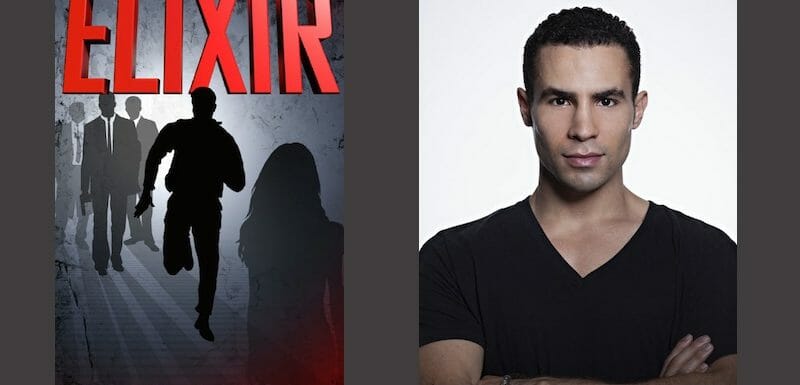 Debut author Ted Galdi’s “Elixir” is the story of a teenage genius who goes on a suspenseful journey to cure his girlfriend of a mysterious illness. According to Galdi, the book has been embraced by the young-adult community as well as the adult-thriller crowd, due to its fast-paced storyline and elements such as the NSA, computer hacking, and big-pharma conspiracy. For this interview, Galdi, who is himself just 29, talked about why he wrote the book and what’s behind the story.
Debut author Ted Galdi’s “Elixir” is the story of a teenage genius who goes on a suspenseful journey to cure his girlfriend of a mysterious illness. According to Galdi, the book has been embraced by the young-adult community as well as the adult-thriller crowd, due to its fast-paced storyline and elements such as the NSA, computer hacking, and big-pharma conspiracy. For this interview, Galdi, who is himself just 29, talked about why he wrote the book and what’s behind the story.
“A lot of people ask me if the book intended to make a political statement about US surveillance and the role of the NSA in everyday lives,” said Galdi. “It’s funny because I had the idea to tie code-breaking and the agency into the story prior to the Edward Snowden controversy popping up. The concepts of computer hacking and corrupt government officials seemed a fitting backdrop to build story conflict around with a teenage-genius protagonist. The decision to include them in Elixir was really as simple as that.”
Galdi said that he was not intending to make a political statement with the book, only tell the story. “I’m sure when people read the book, some of the events in it—though fictional—may advance their pre-conceived opinions on the surveillance issue, but I wasn’t trying to put forth a new line of thinking on the topic, or attempt to sway public opinion pro-NSA or anti-NSA.”
The issues Galdi wanted to deal with in “Elixir” were not those of policy, but those involving people. Galdi said, “Sean, the protagonist, is born with a sky-high IQ, something he grows to resent because it makes him feel different and leads to a handful of negative events early in his life. Through the book, he transforms from being resentful of his gift, to being forced to accept it, to finally appreciating it.”
Galdi, who is himself a member of the International High IQ Society and the One-in-a-Thousand Society, recognizes his protagonist is unusual. He said, “Sean’s sky-high IQ is literally a one-in-billions phenomenon, so I don’t expect many readers to share his exact situation, however, the concept of being born with something you resent and growing to embrace it—whether it be an abnormal IQ or anything else—is universal.”
For some authors, the idea for a book comes to them almost instantaneously. Galdi said that wasn’t the case for him. “There wasn’t a ‘flash’ moment where I was hit with the story all at once. The idea baked in my head for a few months before I even wrote the first sentence. In the very beginning I thought it would be interesting to write about a young genius who gets unintentionally pulled into intense situations because of his intelligence. It was at this point that the concepts of code-breaking and the NSA started taking form.”
With a premise in mind, Galdi knew he still needed a detailed plot for a story he’d want to tell. “I knew the teenage-genius idea would offer enough kicks to fill the book with suspense,” he said. “But, I didn’t want to write a pure-suspense piece. I wanted Elixir to be more than a standard ‘hero on the run’ thriller.”
It was at this point that Galdi began thinking in terms of a coming-of-age story. And he saw hope for his story. “Elixir would have the fast-paced external action of a thriller, but the main character would be morphing internally along the way, dealing with universal adolescent problems like personal identity, guilt, and uncertainty about the future. Once I was at this point, I knew I had enough underlying substance to start building an actual story with an actual plot.
“It was the love element that was the main driver of the plot and the development of most of the other characters. Deciding to weave in Natasha—Sean’s girlfriend who’d later fall ill—was a huge turning point in the evolution of Elixir. His ability to find love—and keep it—became a sort of hinge at the heart of the coming-of-age storyline. Once I was there, the action was pretty natural to get down.”
One of the things that inspired Galdi when writing the relationship between Sean and Natasha was the song, “Plainsong,” by the Cure, which is his favorite song. And here’s an almost-spoiler alert, Galdi said the climax chapter, “The Edge of the World,” is actually based on a lyric in the song. “I also pay tribute to The Cure elsewhere in the book, too. They’re Natasha’s favorite band, and three other chapter names are based on their lyrics as well.”
Galdi added, “What Elixir is trying to say is that the world may give us something we don’t like, but if looked at in the right light, that something may have the potential to be wonderful. Elixir is a story about identity, secrets, and above all, love.”
For more information
Learn more about Ted Galdi on his website at elixirthebook.com. One the website, you can find a list of advance reviews from bloggers and media outlets.

Recent Comments